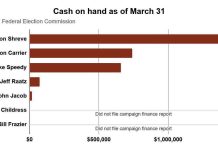INDIANAPOLIS — The Indiana Supreme Court on Wednesday decided a key solar power case in favor of a southern Indiana utility, ending certain benefits for small panel owners but taking pressure off ratepayers who don’t own panels.
Vectren Energy — now part of CenterPoint Energy — and Indiana’s utility regulator had argued a new subsidy scheme follows a 2017 state law, while utility consumer advocates said the methodology wasn’t legal, and would shortchange Hoosiers who generate more energy than they consume.
Before 2017, when ratepayers with solar power panels generated excess electricity, utilities reimbursed them at retail rates at the end of each billing cycle. The commission established that 1-to-1 credit system in 2004 to boost solar panel adoption at a time when the technology was newer and more expensive.
But because utilities typically buy energy at significantly cheaper wholesale prices and sell it at higher retail prices to cover costs, ratepayers without solar panels subsidized the 1-to-1 credit deal.
Senate Bill 309 reshaped that system, cutting reimbursement to 125% of the wholesale rate and setting a timeline for utilities to phase it out completely.
Case background
Vectren in May 2020 asked the commission to approve a new tariff rate rider to procure excess solar energy. It included what the utility called “instantaneous netting,” when a meter instantaneously calculates the different between energy inflow and outflow. That’s in contrast to the previous monthly method, when the utility tallied energy production versus consumption every monthly billing period.
Solar-generating customers would continue paying retail rates on the electricity consumed when the sun wasn’t out, and earn the wholesale-based rate back on the extra electricity produced when the sun was out.
The commission approved that method, but the Court of Appeals overturned it in a January 2022 decision.
The Supreme Court took on the case and heard arguments in September 2022.
In an 11-page decision, Justice Mark Massa upheld the Indiana Utility Regulatory Commission’s approval of Vectren’s subsidy method.
He argued that Indiana’s General Assembly didn’t specify in law how often utilities should measure excess energy, and that rejecting Vectren’s bid would return Indiana to the pre-2017 status quo.
“It is unlikely the Legislature would have overhauled the distributed generation statutes to offset the burden placed on non-(distributed generation) customers by the old scheme only to produce the same result,” Massa wrote.
Two other justices concurred with the decision, while another concurred only in the result. One, who only recently filled a vacant slot, didn’t participate.
—— The Indiana Capital Chronicle (indianacapitalchronicle.com/) is an independent, not-for-profit news organization that covers state government, policy and elections.





